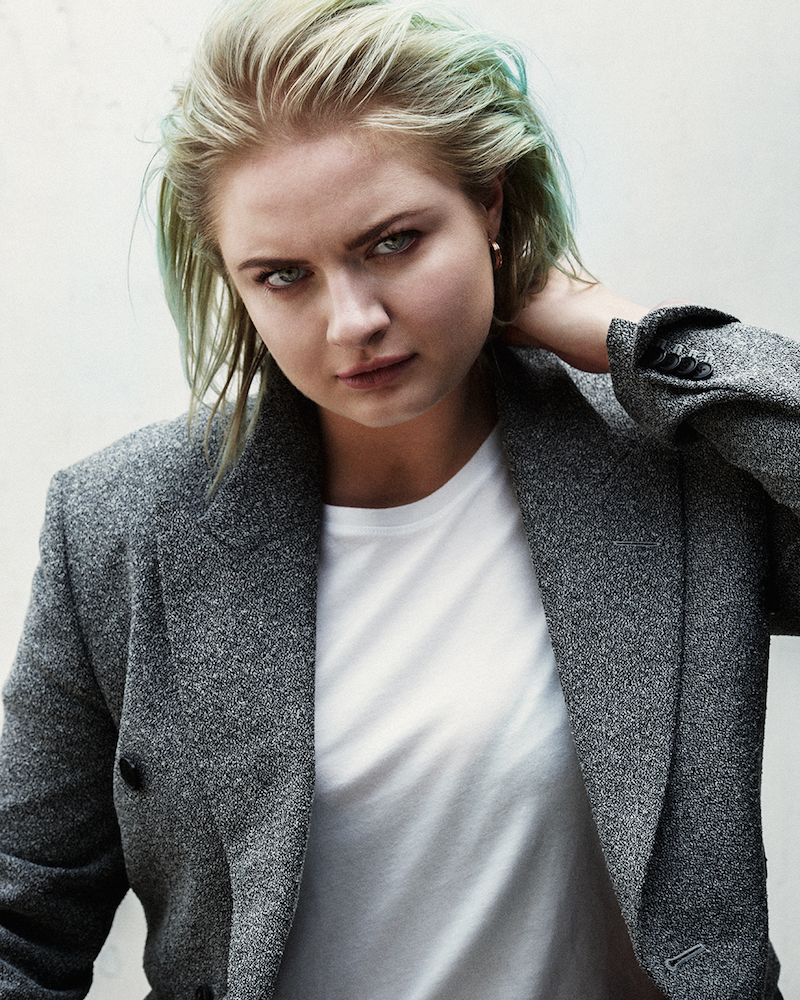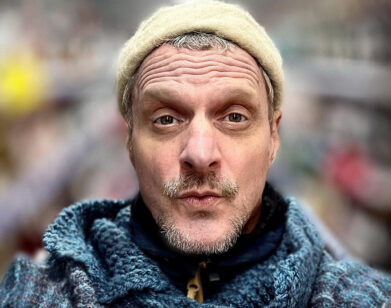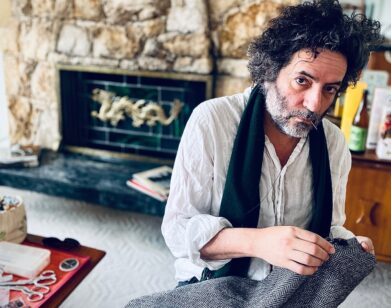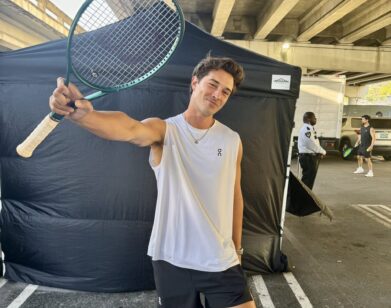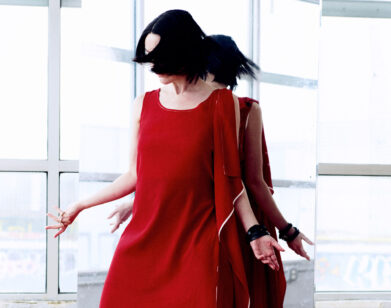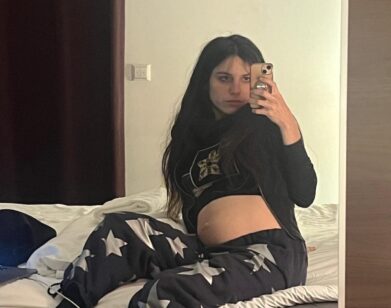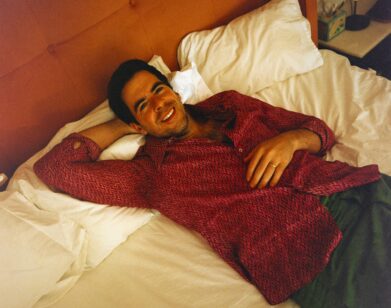Growing Up with Låpsley
LÅPSLEY IN LOS ANGELES, APRIL 2016. PHOTOS: BRIAN HIGBEE. STYLING: SANTA BEVACQUA. HAIR AND MAKEUP: JAKOB SHERWOOD FOR CHANEL AND BUMBLE & BUMBLE AT THE WALL GROUP.
Growing up, Holly Lapsley Fletcher—better known simply as Låpsley—was a straight-A student and classically trained oboist, pianist, and guitarist. By night, however, starting at age 13, she would sneak out of her Southport, England home and take the train to Liverpool, where she partied at raves and discovered the likes of house artist Boddika, dubstep master Benga, and bass producer Joy Orbison. Now, at only 19 years old, Låpsley has performed at Glastonbury and Coachella, and released her debut album Long Way Home in March via XL Recordings. Although she didn’t begin teaching herself Garage Band until age 18, she has quickly carved out her own space within the music industry through genre-blurring production, intimate lyrics, and unique vocal experimentation.
On a track like “Station,” Låpsley creates a meditative dialogue by electronically modifying her naturally high-pitch vocals to those of a tenor. Opening the song in a man’s voice, she sings, “I will ring you up / Say I want you back … Give her two months, she’ll be,” immediately echoing “Over that” in her natural tone. In a song like “Hurt Me,” her lyricism exposes her vulnerability, albeit masked by fickle bravery, and backed by a beautifully fluctuating electronic soundscape.
Though she planned to attend Bristol or Cambridge University after graduating high school last year, Låpsley has clearly postponed that idea. In addition to Long Way Home and major festival appearances, she has also appeared on television shows (The Late Show with Stephen Colbert included) and frequently plays acoustic versions of her own songs as well as covers on esteemed radio shows. Currently, she is on her first headlining tour and tonight she will play at the Music Hall of Williamsburg in Brooklyn. On a day off from touring, we spoke with the writer and musician over the phone.
EMILY MCDERMOTT: I hear you’re in Minneapolis, in bed eating breakfast.
LÅPSLEY: Well, I’ve just finished. [laughs] Today is my day off. I’m not going to move from the bed. Tomorrow I have a show.
MCDERMOTT: So growing up, I know you were classically trained, but were you also a big performer?
LÅPSLEY: I was definitely not a natural performer. It scares the shit out of me, most of the time, going on stage. I’d rather go on stage and talk or do public speaking than sing. Singing is very scary. It’s very exposing. It’s easier the more shows you do because you become used to it and find ways to cope and feel comfortable on stage. Mine’s to chat in between songs, that makes me feel more like I’m with real people. Sometimes before I go on stage, I think about how people can be so judgmental and forget they’re the ones who bought your album, they’re the ones that are singing along.
MCDERMOTT: Do you remember the first time you performed?
LÅPSLEY: It was probably something in school. I was always with the orchestra. I think I might have played a song on piano or guitar in a school talent show. I went to an all girls school, so there were always little things going on, but it wasn’t really until I was 17 that I did a proper performance. My first big one was Glastonbury, before I was signed. I was thrown in the deep end. I look at the video now and it’s the shittiest thing I’ve ever done. But I had nothing else to compare it to.
MCDERMOTT: So I know you went to raves and whatnot when you were a young teenager. How did you manage to keep that from your parents? I assume they didn’t know where you were going…
LÅPSLEY: Well, they didn’t know, so they had nothing to worry about. I used to just sneak out of the house or lie and say I was staying at someone else’s house. I was very sneaky. I think when you are very academic, you can get away with it because in their mind, it’s like, “Oh my child’s doing well in school, I don’t have anything to worry about.” But actually, I was unhappy and rebelling. It’s being a creative person and not realizing it that manifested itself. I had no outlet of talking about things, and I don’t really understand myself. All I know is that when I started to produce, it was like I found something that was creative and it let me breathe again. I didn’t understand how I was doing so well in school but I wasn’t satisfied. It was not what I wanted to do, but when you’re good at something people are like, “That’s what you should do,” even if it’s not necessarily the right thing.
MCDERMOTT: What originally prompted you to start exploring production?
LÅPSLEY: I had some ideas on piano and I wanted to record it. Since I used to go out and loved electronic music, I knew it was made with computers and synthesizers. Those are the modern instruments of today, not the classical things. It was exciting to mess around on Garage Band, do whatever I wanted, and have the chance to make the kind of music I listen to. Of course, when I made music, it wasn’t heavy rave music. I seem to have an appreciation for other types of music that merged into something in that sat comfortably in the middle of everything.
MCDERMOTT: That’s something that I love about your music. One song will have R&B undertones and then something like “Operator” has incredible jazz elements. Where does the jazz sound come from?
LÅPSLEY: I think there was a crossover. When you learn music in a classical way, you get to a point where the crossover that the teachers show you and that you are taught is into the jazz world. You have to master an instrument before you go into the jazz world, and I was never good enough, but I remember going to some of the jazz clubs. I played oboe, and there’s no one in the world that’s a fucking jazz oboist, but I was determined. I really wanted to go to jazz clubs. My granddad also played New Orleans trumpet. Not a lot, but there was always an appreciation for jazz in the family and it integrated into the kind of music I listened to. I was obsessed with a lot of older music—Duke Ellington, Ella Fitzgerald.
MCDERMOTT: What do you find yourself listening to now?
LÅPSLEY: Now I have to prepare for radio shows, so I force myself to listen to new music. Otherwise I just go back and love old records. At the moment I really like “iT” by Christine and The Queens. I really like Young Fathers and Anderson .Paak. I’ve been really surprised when I’ve made the effort to listen to new music, what I’ve found. New music is great to play, especially if I catch it early, on the radio shows that I do. There’s definitely a pressure to have an understanding of where music is at the moment, but it’s very odd when people compare me to modern new artists. Some of them I’ve not even heard of.
MCDERMOTT: With that, I’ve read that you don’t really like some of the labels that are put upon you, like “female producer” or “singer/songwriter.” So if you could describe yourself, what would you say?
LÅPSLEY: Primarily I’m a writer. I would just say a writer and musician. I’ve not earned my stripes to say I’m a performer yet, but hopefully by the next tour, I can be like, “I’m a performer as well. I enjoy performing.” At the moment, it’s very stressful. I think writing is where I’m most comfortable in the studio. It all comes down to the song in its basic form on piano and the words I’m writing.
MCDERMOTT: In the last year, how do you think your process has changed? It’s been quite a catapult from finishing school to now performing at festivals like Coachella.
LÅPSLEY: I don’t think my writing’s changed that much, but my production has. Moving from being on your own in a bedroom to a professional studio is scary. There are a lot of things you need to catch up on in terms of understanding how the equipment works and the shortcuts on the software. That’s very time consuming and it can be very frustrating when you’re trying to choose a synth sound, and there’s 50 sounds on the thing. But I love the challenge of production, that’s what keeps it exciting for me. My project is production. Writing comes easily, but production you have to think and apply.
MCDERMOTT: You worked with Rhdaidh McDonald on the album. What do you think you learned from working with him?
LÅPSLEY: I think it’s getting my grips around Logic—wrapping my head around it, understanding how much you can do. He’s a facilitator for my ideas in the production sense. Sometimes he would expand on it, suggest things that I never would have thought of. He would push me to be a be a better version of myself. In order for me to be a better producer, I need to be pushed, I need people to ask the questions and see my flaws and help me improve.
MCDERMOTT: When I first heard your music, I hadn’t read about you, and I genuinely thought there was a man singing on some of the tracks. At what point did you start experimenting with your voice?
LÅPSLEY: I think it was around the time that I put “Station” out. I really like the male tone. I prefer to listen to a lot of male singers, rather than females. Sometimes I find it a bit too shrill. I even find my own voice a bit too high. I wish it was a bit more androgynous. But I love how you’re creating almost a different person; you can talk about different things, you can show the song in a different light, you can show a different point of view, or it can be like a call and response. There are so many things you can do with it. It’s just another instrument in a way.
MCDERMOTT: I also watched the Prince cover that you did. How did you come to terms with performing “Nothing Compares 2 U” the day he died? I imagine it must’ve been quite emotional and intimidating.
LÅPSLEY: I went on literally 10 or 15 minutes after the news. It was like, “Boom!” and I went to reception and asked them to print off the chords. I had one run through and it was like, “Okay, I’m just going to do it, it’s the moment.” There’s a certain pressure when you do radio that makes it so unique because you only have one shot and it’s live. It was weird, though, when I played it because some of the people in the studio had met him and worked with him, and everyone was really quiet. As soon as I finished it was like the news suddenly hit everyone. It was intense.
MCDERMOTT: Did you listen to Prince a lot growing up?
LÅPSLEY: I didn’t. My parents were almost slightly too young, teenagers in the ’80s, into different stuff. But you grow up with Prince’s hits; they were always around. I was trying to think of a song that I connected to, that I knew Prince had written. I did research on the songs that he wrote but he didn’t necessarily perform, and “Nothing Compares 2 U” is beautiful. In his version, he changes some of the lyrics and I decided to sing his version.
MCDERMOTT: As one last question, if you had to give a new artist a piece of advice what would it be?
LÅPSLEY: Make music for yourself before you make it for anyone else. The moment that changes is the moment that you’re not doing it for the right reasons. The music changes when you see artists start doing it for other people rather than themselves. You often lose that soul that an artist has with their first album, but they don’t in the future.
MCDERMOTT: Have you struggled with maintaining the kind of creative control to be able to seriously make music for yourself?
LÅPSLEY: I have no fear in speaking to the label, speaking to the people, about giving me time and letting me work it out myself. There’s obviously been pressure, like “Oh, it will be so easy if we put you with a producer or put you a writer,” but it’s like, yeah maybe we would make a good song, but it wouldn’t be me, would it? I want to get to the level where people want to get put with me, because I want to be a producer and a writer in my own right, and that’s not going to happen if you take shortcuts. So my work might not be perfect, but it’s my work and that originality should carry something.
LÅPSLEY IS PERFORMING TONIGHT, MAY 11, AND TOMORROW, MAY 12, AT THE MUSIC HALL OF WILLIAMSBURG. FOR MORE, VISIT HER FACEBOOK.

